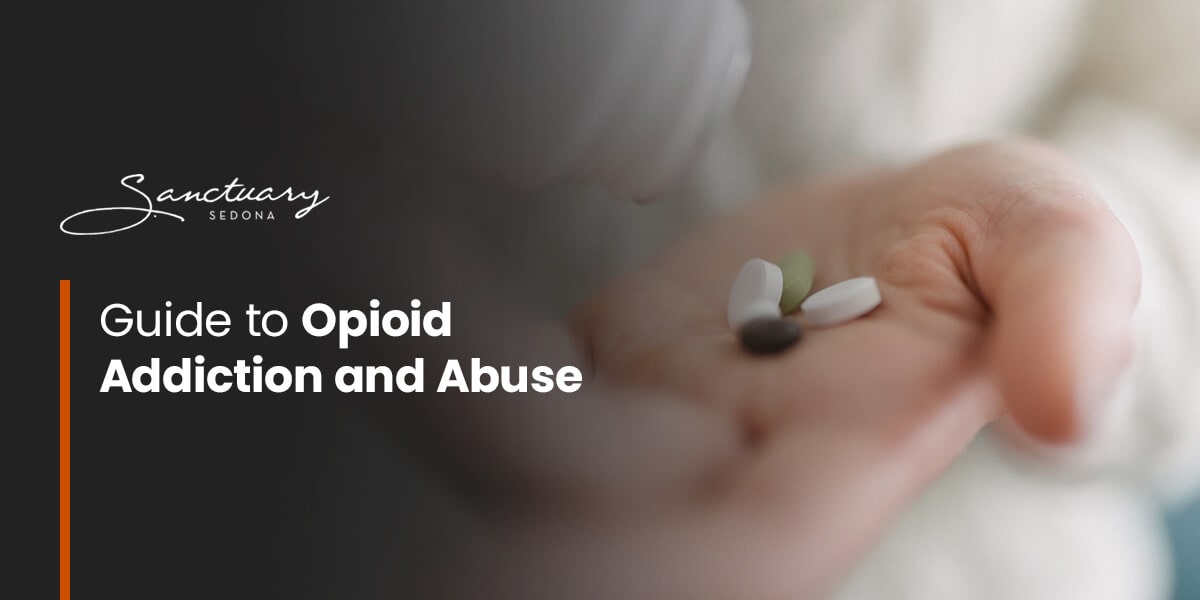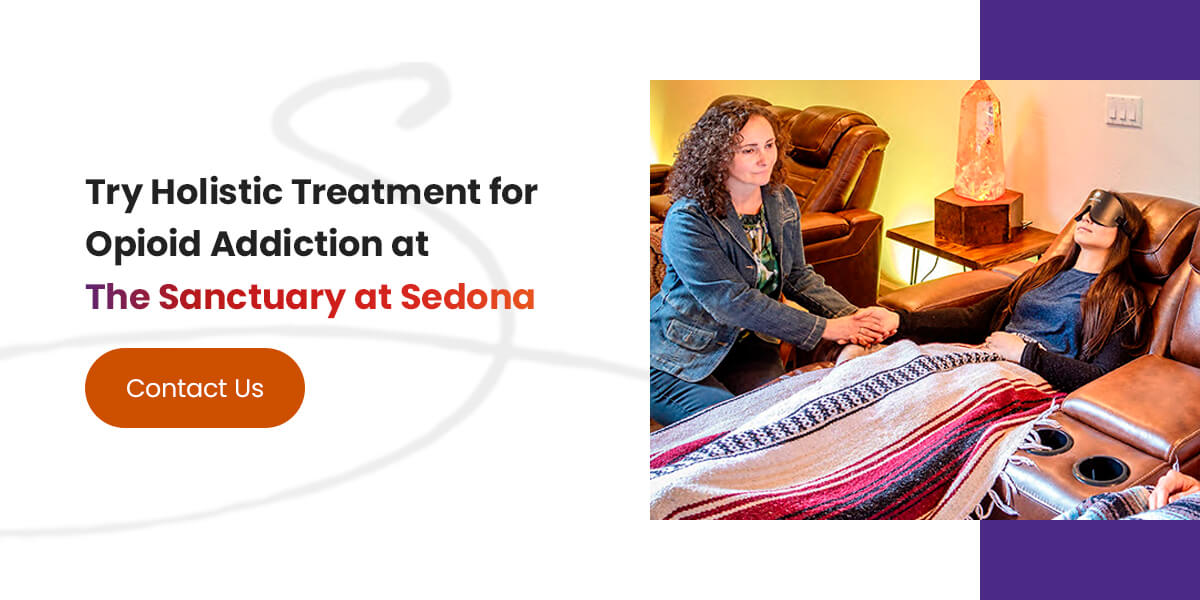In 2021, the Centers for Disease Control and Prevention (CDC) reported over 100,000 opioid overdose deaths. From the year before, there was a significant rise in opioid abuse. Prescription drugs can be misused, and recreational opioids are easily accessible.
Opioid addiction can have drastic life consequences, impacting a person’s health, lifestyle and personal relationships. The longer opioids are used, the more severe the effects become. This guide to opioid addiction and abuse prevention can help you understand how addiction forms and what treatments are available.
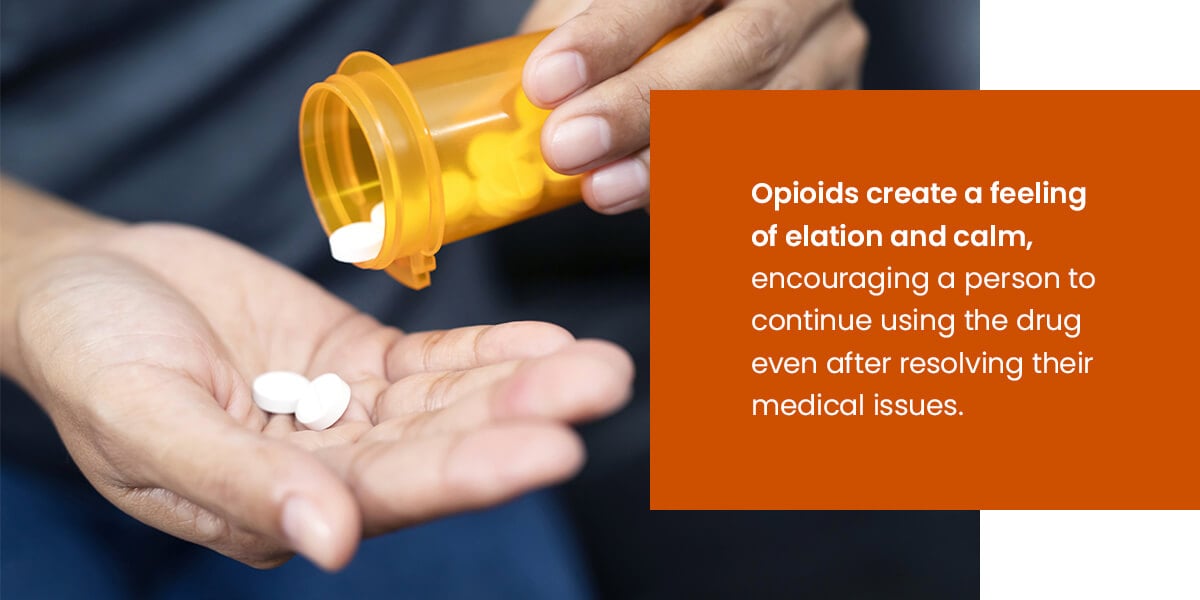
Opioid Addiction and Abuse
Opioids, also known as opiates, are a group of drugs made from opium or synthetic compounds similar to opium. Opium comes from the poppy plant, which mainly grows in southern Asia, and is used to create prescription pain medications and heroin. Opioid drugs can be used for legitimate medical reasons, such as chronic pain management. However, opioids are also used illicitly for the euphoric high they produce. Some people seek the high to self-medicate, while others become addicted to the sensation after being influenced by their peers.
Opioids work by attaching to opioid receptors in nerve cells in the brain, spinal cord and other parts of the body. The drug blocks pain messages from reaching the brain. Opioids also create a feeling of elation and calm, encouraging a person to continue using the drug even after resolving their medical issues.
Some people don’t have medical problems before using opioids. They may start using due to peer pressure or a desire to experiment with drugs. They can become dependent on the perceived high, prioritizing the drug over other aspects of their life.
It’s easy to misuse opioids and form an addiction regardless of its intended use. People can develop a tolerance to opioids quickly without realizing it. If this occurs, they’ll need an increased dose to achieve the same effect as before. This tolerance could lead a person taking opioids for chronic pain to increase their dose independently without talking with their doctor.
A person who uses opioids illicitly might require more of the drug to achieve a euphoric effect. Some people even use opioids for the sense of calm it delivers, temporarily relieving them of mental health symptoms. However, using opioids can make many mental health conditions worse. The higher the dose a person needs to achieve a high, the more severe the side effects become. A higher dose without a doctor’s approval also increases the chance of an overdose.
Signs and Symptoms of Opioid Abuse
Opioid use disorder (OUD) has various effects on a person’s physical, mental and emotional health. If you or a loved one are trying to determine if an opioid addiction exists, the following signs and symptoms can help you identify a problem and decide whether you should seek treatment.
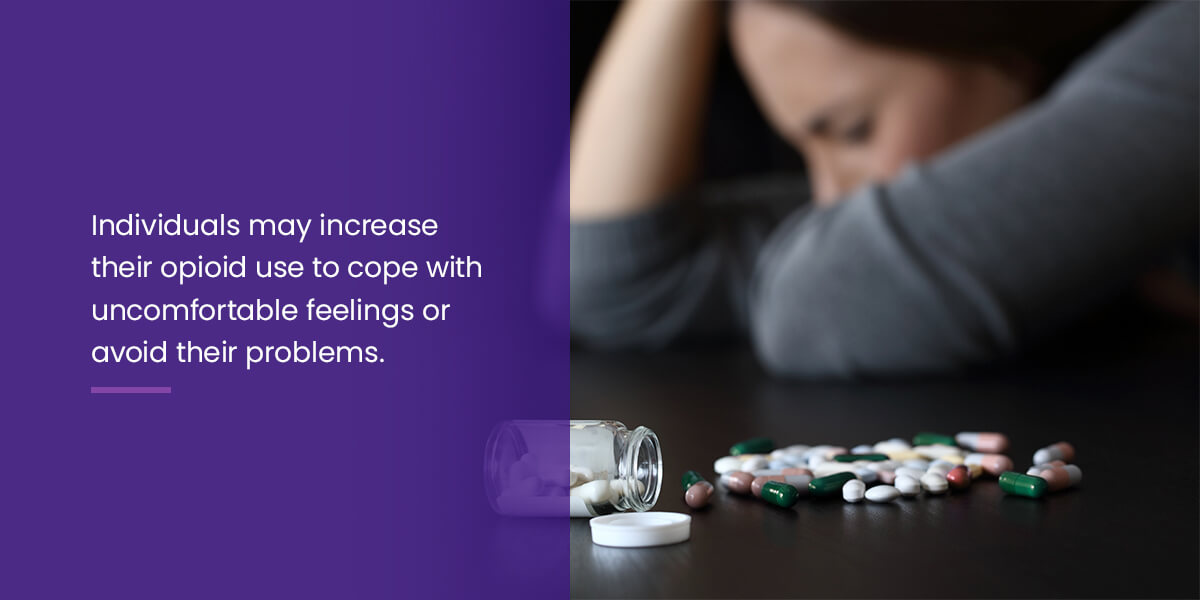
Signs of Opioid Abuse
A person’s life can be drastically affected by opioid abuse. A person with an opioid addiction will be obsessed with finding and using the drug, but this is just one of the signs of addiction. Additional signs include:
- Isolation from friends and family
- Increased anger and irritability
- A new group of peers who use opioids recreationally
- A drastic change in appearance
- Lack of hygiene
- Constantly lying about their whereabouts and opioid use
- Continued absences from work or school
- Decline in productivity
- Loss of interest in hobbies
- Difficulty concentrating on tasks
- Failed attempts to quit
- Inability to follow through on plans
- Sleep disturbances
Many of these behavioral changes can cause additional stress, which can trigger addiction. Individuals may increase their opioid use to cope with uncomfortable feelings or avoid their problems. They may also experience financial difficulties due to their addiction. If they don’t have an opioid prescription, they’ll have to buy them illicitly, which can quickly become expensive. The stronger their addiction, the more frequently they’ll need access to the drug.
Financial strain can cause additional tension, possibly influencing a person to use opioids more frequently to relieve stress. They’ll have to find ways to finance their addiction, and some people may turn to crimes like robbery or shoplifting. This becomes a slippery slope, and a person can become involved in the legal system, which comes with various consequences.
If you or a loved one is experiencing any of these signs of opioid addiction, it’s time to seek help from an addiction specialist.
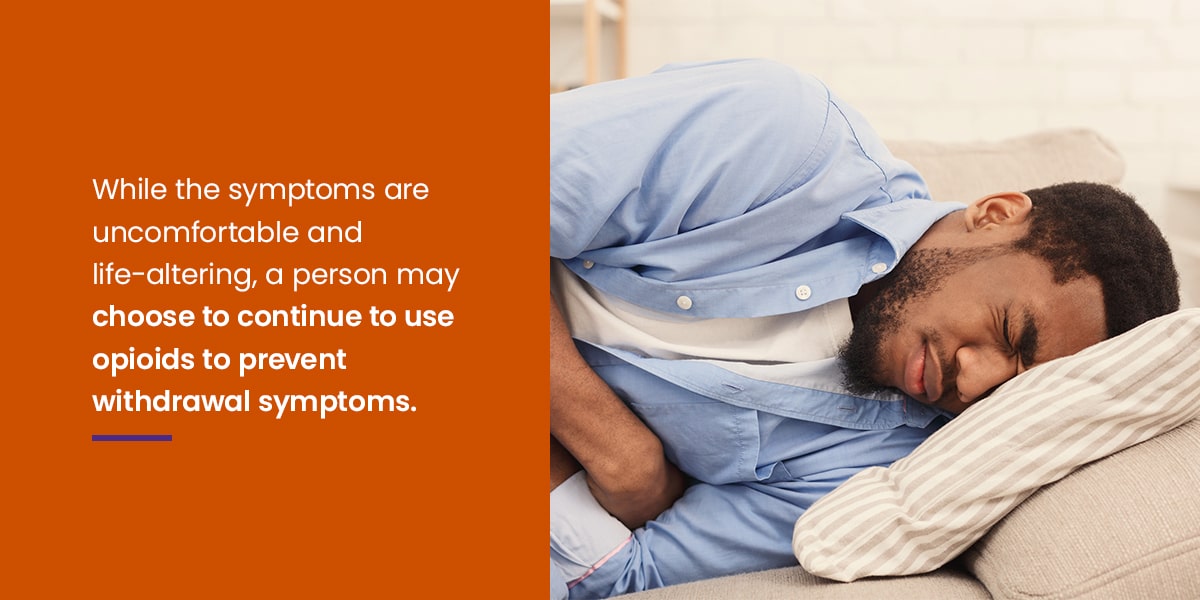
Symptoms of Opioid Abuse
There are distinct physical and mental symptoms of opioid addiction. Some of the common symptoms are:
- Impaired coordination and balance
- Dilated pupils
- Nausea or vomiting
- Challenges with memory
- Shallow breathing
- Slowed heart rate
- Delayed reflexes
- Fatigue
- Mood swings
- Depression, anxiety and paranoia
- Weight fluctuation
- Perceived numbness to pain
While these symptoms are uncomfortable and life-altering, a person may choose to continue to use opioids to prevent withdrawal symptoms. Their body may also convince them that opioids are an essential part of their life. However, continuing to use opioids will increase the body’s tolerance to the drug and increase the symptoms and effects.
Effects of Opioid Abuse
Opioid addiction has drastic effects on a person’s body, mental health and personal life. Even people who have just started using opioids can experience severe health effects. Learn about some of the dangers of taking opioids and how they can affect a person’s life.
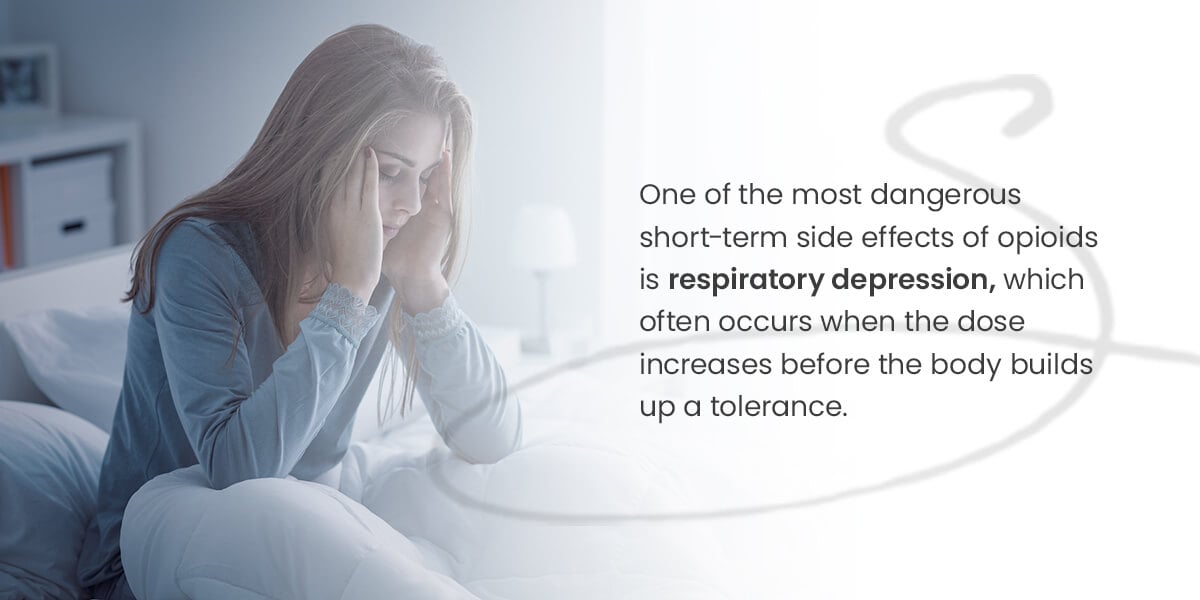
Short-Term Effects
There’s a common misconception that using opioids once will have little to no adverse side effects. However, using opioids even once can have numerous negative symptoms, such as:
- Drowsiness or inability to stay awake
- General confusion
- Slowed or erratic breathing
- Nausea or vomiting
- Constipation
- Shame, guilt or suicidal ideation
- Flu-like symptoms
One of the most dangerous short-term side effects of opioids is respiratory depression, which often occurs when the dose increases before the body builds up a tolerance. If a person is taking prescription opioids, they might take more than prescribed due to a lack of information. Someone who has obtained opioids illegally might be unaware of their body’s tolerance and take more than they can handle.
A large dose can cause a person’s breathing to become slow and inadequate, limiting the amount of oxygen that reaches the brain. When this happens, a person can fall unconscious or slip into a coma. In some cases, severe respiratory depression can cause a person to stop breathing altogether and be fatal if they don’t seek immediate medical attention.
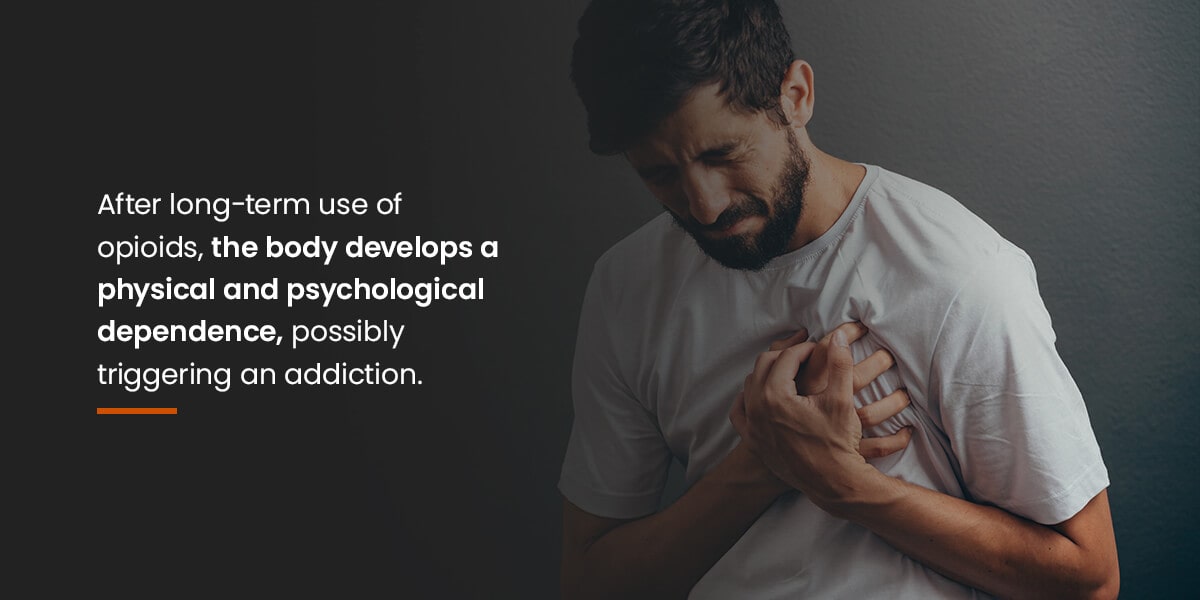
Long-Term Effects
When a person continues to use opioids for an extended period, their body begins to see opioids as a required part of survival. After long-term use of opioids, the body develops a physical and psychological dependence, possibly triggering an addiction. The following are some of the long-term effects of opioid addiction:
- Neurological changes
- Tense or damaged personal relationships
- Cardiovascular problems
- Isolation and loneliness
- Poor performance at work or school
- Digestive issues
- Brain damage
- Financial stress
Opioid abuse can also cause legal trouble. A person who uses opioids or heroin is more likely to get arrested or incarcerated. People might commit crimes like burglary, shoplifting or robbery to afford their addiction. These crimes can result in an arrest, creating a criminal record that can make it challenging for a person to find work, secure a mortgage or get into college.
A criminal record also comes with a stigma. People may view you differently, casting unfair judgments on your character based on circumstances in your past. It’s essential to treat opioid addiction as soon as possible to improve your health and personal life while preventing the drastic long-term effects of addiction.
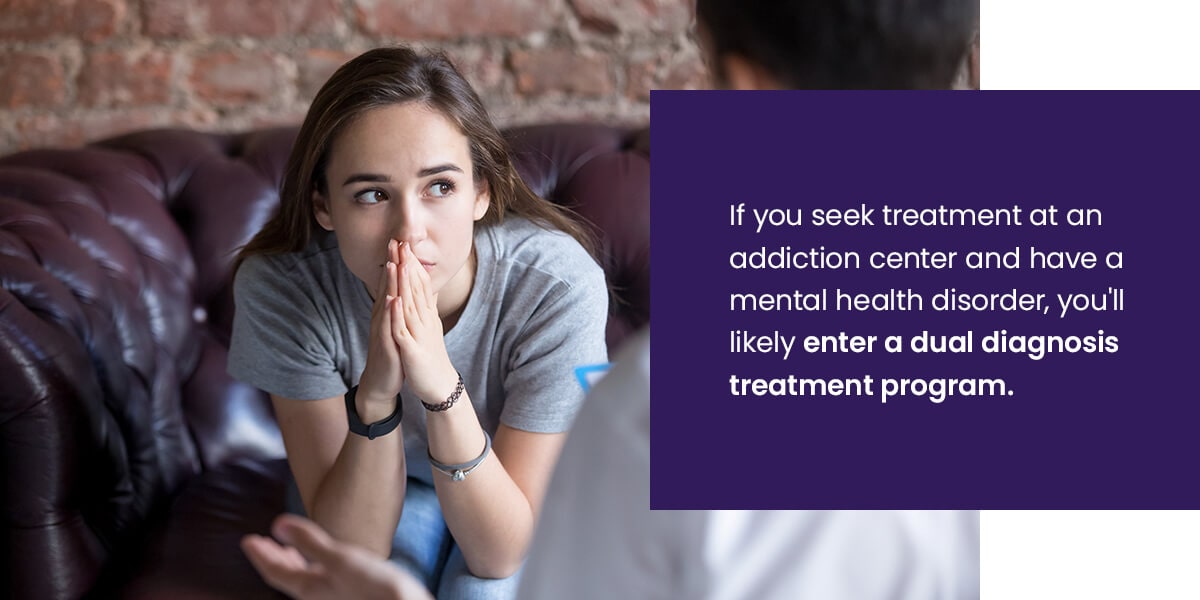
Opioids and Co-Occurring Disorders
Substance use disorders often coincide with mental health conditions, referred to as co-occurring disorders. Some people start using opioids to cope with mental health symptoms, replacing their uncomfortable feelings and thoughts with a euphoric high. A person might use opioids to reduce their anxiety and induce a sense of calm. Self-medicating can cause a person to become dependent on opioids and trigger an addiction. However, opioid addiction can cause additional feelings of depression, anxiety, paranoia and mood instability, worsening certain mental health conditions.
These mental health disorders often accompany opioid addiction:
- Depression
- Anxiety, including panic disorder
- Bipolar
- Attention deficit hyperactivity disorder (ADHD)
- Post-traumatic stress disorder (PTSD)
- Oppositional defiant disorder (ODD)
- Additional drug addictions
When one or more of these conditions exist alongside an opioid addiction, it’s essential to treat them simultaneously, as underlying mental health conditions are often the trigger for substance abuse. If you seek treatment at an addiction center and have a mental health disorder, you’ll likely enter a dual diagnosis treatment program.
These programs treat mental health conditions while recovering from addiction to heal the body, mind, soul and spirit. A “whole-person” approach treats the mental and emotional triggers that lead to addiction. Rather than relying on opioids to heal mental health conditions, a person will learn healthy coping mechanisms to deal with uncomfortable feelings. The end goal is to heal the mind to improve mental health conditions and rebalance your life.
Holistic treatment is one of the best options for treating co-occurring disorders. Rather than seeing addiction as one condition and mental health as another, they’re treated together with a direct correlation. Holistic treatment uses evidence-based therapies alongside whole-body healing to:
- Restore balance in the mind
- Calm the symptoms of both conditions
- Ease patients into their treatment
- Transition from “recovery” to “recovered”
At the start of a dual diagnosis program, you’ll begin by detoxing your body from opioids. You’ll consult with a therapist and will have time to adjust to your environment and rebalance your nervous system. Once you’re comfortable, you’ll participate in therapy and other holistic treatments to address underlying issues. This is when you’ll discuss sensitive topics and heal any trauma or conditions that may have led to your addiction.
If you’ve tried traditional addiction treatment methods in the past and found little success, remember that recovery is still possible. Holistic treatments can provide an avenue to reach sobriety using methods you may not have tried before. With holistic medicine, you’ll address the underlying cause of your addiction simultaneously, improving your chances of making a full recovery and getting your life back on track.
Can You Recover From an Opioid Addiction?
Opioid addiction can drastically impact your life, affecting your physical and mental health, professional productivity and personal relationships.
You might be frustrated after participating in traditional addiction treatment programs and still experiencing a relapse. Opioid addiction is a disease, but it’s not incurable. If other treatments have failed for you in the past, holistic medicine can provide you relief and rebalance your life. A total transformation becomes possible by treating the whole person rather than just the addiction. There are multiple treatment options available for opioid addiction. Below are some of the most effective options to help empower you to reclaim your life and reach sobriety.
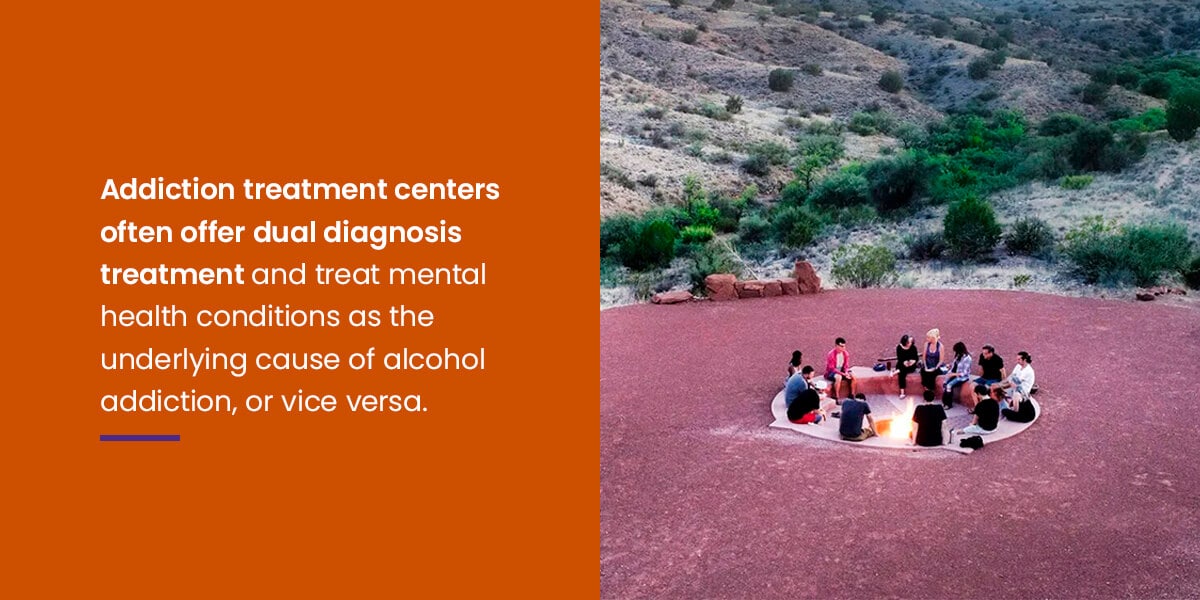
Non-12 Step Holistic Treatment
If you’ve tried to treat your addiction in the past, you’ve likely participated in a 12-step program. Some people continue to struggle with relapse despite consistent participation in these programs. Others don’t always agree with the tenants of these programs, making it more challenging to engage with the curriculum.
Non-12 step holistic treatment is an alternative to these programs, using evidence-based clinical methods alongside ancient healing practices. A non-12 step program focuses on healing addiction and the underlying cause simultaneously. These programs focus on the whole person, including the body, mind, soul and spirit, and apply therapies based on an individual’s needs. You’ll understand how your thoughts and beliefs influence your addiction, advancing your recovery.
Some of the therapies involved in a non-12 step program are:
- Cognitive-behavioral therapy (CBT)
- Energy medicine therapies
- Acceptance commitment therapy (ACT)
- Trauma release exercise (TRE)
- Inner child therapy
- Guided imagery
- Eye movement desensitization and reprocessing (EMDR)
These are just a few therapies involved in a non-12 step program. A medical professional will help you determine what combination of treatment is right for you.
IV Therapy
Mental health conditions often overload the brain with stress hormones, which can cause irritability, poor decision-making, sleep disturbances and feelings of hopelessness. These symptoms can drive a person to use opioids to self-medicate, leading to addiction. Opioid addiction can affect chemicals in the brain and disrupt the central nervous system.
The brain needs additional nutrients to restore a natural chemical balance. IV drip therapy provides these nutrients, allowing individuals to feel better sooner so they can delve deep into their recovery. IV therapy delivers vital nutrients directly to the bloodstream, quickly restoring balance to the body. Immune function is also improved, making the detoxification process more comfortable.
NAD+ Therapy
Nicotinamide adenine dinucleotide (NAD+) therapy replenishes a naturally occurring co-enzyme. This therapy prepares your body and mind for addiction treatment and streamlines the healing of opioid addiction and various mental health conditions. When taken in higher doses, NAD+ therapy can:
- Repair your DNA
- Improve cell communication
- Improve immunity function
- Restore brain function
- Cleanse your body of opioids
- Replenish your energy
NAD+ therapy can be administered through an IV to deliver the co-enzyme to the body. It’s an effective way to begin opioid addiction treatment and repair your physical health so you can address the underlying causes of substance misuse.
Frequently Asked Questions About Opioid Addiction
The amount of information surrounding opioid addiction can seem overwhelming, and you likely have questions. Below, we’ll answer some of the most common questions about opioid addiction to simplify the process and encourage people to seek treatment.
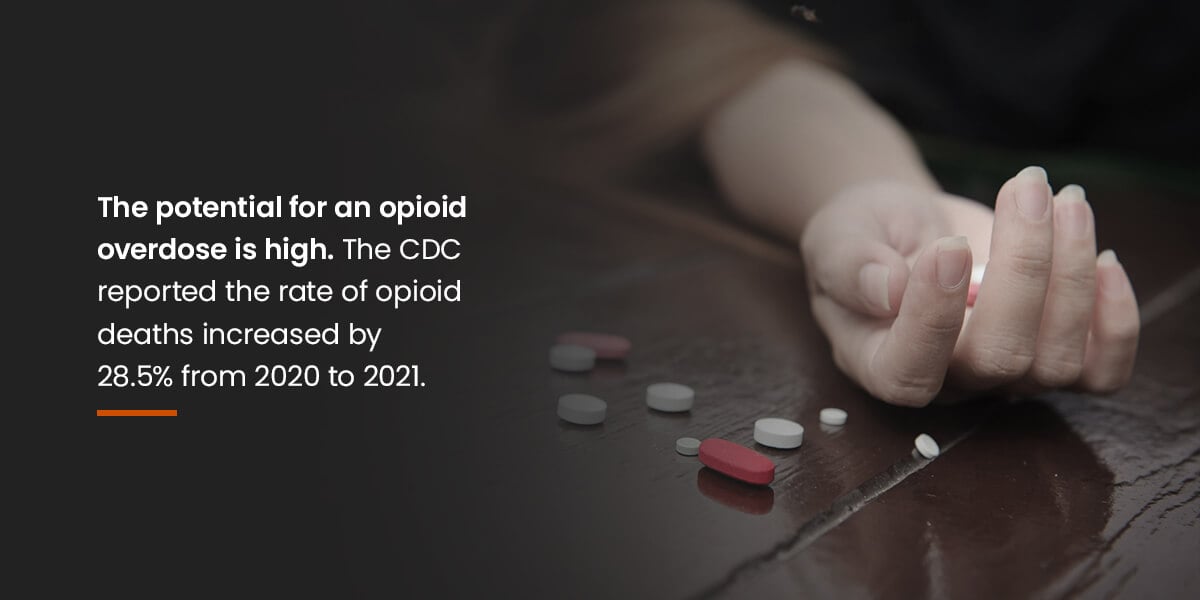
1. Can You Overdose on Opioids?
The potential for an opioid overdose is high. The CDC reported the rate of opioid deaths increased by 28.5% from 2020 to 2021. The symptoms of an opioid overdose include:
- Extremely low heart rate
- Shallow breathing
- Unresponsive to stimulus
- Constricted pupils
- Pale skin
- Seizures
- Blue lips or fingernails
Even if a person takes opioids once, they may take more than their body can handle and slip into severe respiratory depression. This would stop their breathing and deprive their body of vital oxygen. Talking an extra dose of a prescribed medication can also result in an opioid overdose. If you take prescribed pain medication, it’s essential to follow your physician’s instructions and never take more than prescribed. If you think you need to increase your dose for chronic pain management, talk with your doctor first.
2. What Withdrawal Symptoms Are Associated With Opioid Abuse?
If you’ve been taking opioids for a long time and stop taking them suddenly, you’ll likely experience some of these withdrawal symptoms:
- Painful cramps
- Watery eyes or runny nose
- Tremors or spasms
- Hot flashes or chills
- Loss of appetite
- Insomnia or sleep disturbances
- Cravings
- Nausea or diarrhea
Withdrawal symptoms can often make people feel uncomfortable and deter them from quitting. However, an addiction treatment center can help make the detoxification process more comfortable, allowing patients to focus on their recovery and address the underlying causes of their addiction.
3. How Do You Know If You Are Addicted?
If you’re not sure if you or a loved one is addicted to opioids, there are a few telltale signs:
- Taking more than prescribed
- Mood changes, including hostility
- Risky behavior or decision-making
- Sleep disturbances
- Using other people’s medications or obtaining opioids illegally
- Lying or being defensive about opioid use
- Failed attempts to quit
- Falling behind on personal or professional obligations
- Financial struggles
- Tense personal relationships
If you notice any of these signs in yourself or a loved one, they may be addicted to opioids. Once you suspect an addiction, it’s essential to seek treatment as soon as possible to improve your health and prevent an overdose.
4. How Can I Help a Loved One Through Opioid Addiction?
Opioid addiction can affect anyone, and you may have a loved one currently struggling with opioid abuse. You’re likely concerned about their well-being and looking for ways to help. Your support during this time is a vital part of their recovery. If you’re unsure if a loved one is struggling with addiction, you can look for the signs described in the section above.
If the signs seem familiar, a loved one is likely going through an opioid addiction. One of the best ways to help is acknowledging that the addiction exists. Your loved one may be denying that there’s a problem, so it’s essential to talk with them and have them analyze their opioid misuse.
When discussing opioid addiction, do your best not to blame your loved one for their addiction. Use “I” statements so they don’t feel attacked and immediately put distance between the two of you. Make it clear how their opioid misuse has impacted you, giving them concrete examples that provide them with the chance to see things from your perspective. Let them know that you’re not angry, but you’re concerned about their well-being.
Once they’ve acknowledged their addiction, it’s time to encourage them to seek treatment. Research what options are available beforehand to take the burden off their shoulders. Help them enroll in a treatment program or speak with a medical professional for recommendations. Emphasize that you’ll support them through each step of the process and be there for them through each challenge and success. Your continued support can encourage them to seek and continue treatment until they’ve fully recovered.
Try Holistic Treatment for Opioid Addiction at The Sanctuary at Sedona
If you’ve tried traditional addiction treatment programs in the past and have struggled with relapse, it might be time to try something new. Holistic treatment can help you find the relief you’re looking for and restore balance in your life. At The Sanctuary at Sedona, we combine evidence-based clinical treatment with holistic treatment to heal your body, mind, soul and spirit. We focus on healing the whole person rather than just their addiction.
You’re never alone on your healing journey. Take the first step towards recovery, and contact us today to learn more about our holistic treatment programs and how we can help you thrive in a sober environment.

